
Notes From Olympia: Feb. 12, Week 5 of the 2021 Legislative Session
In this week’s Notes from Olympia: the Early Action bill passes, cut offs approach and all eyes turn to budgets.
A Moment of Levity
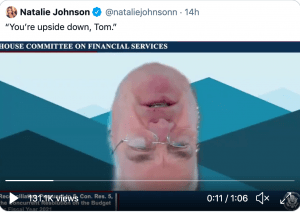
The universe must have known we needed some humor this week. I trust you’ve all seen the video of the lawyer who didn’t know how to turn off his cat filter in virtual court.
This gem above came from a recent Congressional hearing. The Chair interrupted the testifier to ask, “Are you OK? You’re upside down, Tom.” Comments included, “is this a metaphor?” “Stand on your head to fix it.” Gave me a chuckle…
Trivia!
During this virtual legislative session, TVW is a lifeline for those invested in the legislative process. Given the reliance on TVW to do our jobs, I interviewed TVW’s President and CEO Renee Radcliff Sinclair to inform this week’s trivia. Be sure to read to the end to catch some classic pictures and get more backstory on TVW.
- Which current statewide elected officer was instrumental in the development of TVW?
- What was TVW’s original name?
- When did TVW go on the air?
- What event was first broadcast?
- What is TVW’s budget and how much of that does the state cover?
Highlights of the Week
Early Action Bill on its way to the Governor. On Wednesday, the Senate approved the Early Action Bill, ESHB 1368. This measure invests $2.2 billion in federal dollars to provide relief and support to sectors such as small business, child care, public health and K-12 education. A total of $50 million is included for child care and will go toward: grants for licensed providers, payments to Family Friend and Neighbor providers, increased reimbursement for school-age children through April, and provide funding for the Department of Children, Youth and Families to incentivize providers to serve children participating in the subsidy program. See our January 29th newsletter for more specifics on the use of the $50 million.
Because no amendments were adopted in the Senate, the bill moves to Governor Inslee for action. He is expected to sign the measure swiftly so dollars can get out. The Spokesman Review has a good summary of the package components as well as a recap of the Floor debate.
With an additional federal relief package under review, discussions are underway as to how best to respond to any additional federal dollars the state may receive, including questions around timing. Would additional new dollars be folded into the 2021-23 operating budget? Could the 2021-23 operating budget include “placeholders” or lay out a plan for spending future dollars (particularly challenging if funding levels are unknown when the legislature adjourns in late April)? If dollars are in this fiscal year, would the legislature adopt another supplemental budget? Many questions remain at this point.
Child Care and Fair Start Act Are Focus of TVW Interview. On this week’s “Inside Olympia,” host Austin Jenkins interviewed House Children, Youth and Families Chair Tana Senn and House Children, Youth and Families Ranking Republican Member Representative Tom Dent. The conversation focused on child care and how the pandemic has impacted the child care industry, and the Fair Start for Kids Act.
It is a fascinating 30 minutes that highlights the differing philosophical approaches to early learning. Representative Senn talked about the value of quality early learning, particularly given the science on brain development, and the need for sufficient investment to support quality. Representative Dent focused his remarks on the regulatory structure in our current system, arguing that regulations are pushing out providers.
Senate Republicans Release Operating Budget. On Thursday, Senate Republicans released their proposed budget, SB 5451. This summary provides an overview of not only the Senate Republican’s proposed expenditures, but also their proposed rationale for their budget’s revenue base. The Senate Republican budget does not propose new revenue sources, looks to maximize new federal dollars, accesses the Budget Stabilization Account (the state’s Rainy Day Fund), and proposes redirecting $721 million from sales tax revenue from the sale of vehicles to the transportation budget, rather than the operating budget as is the norm.
This proposed budget is a signal of the minority party’s priorities and vision. In early learning, for example, they propose investing $58.2 million to fix the co-pay cliff, placing a maximum $115 a month co-payment for families in Working Connections Child care; investing $112.1 million in child care provider grants and to raise the Working Connections Child Care reimbursement rate to the 75th percentile of market rate; and investing $57.8 million to provide a 7% increase for ECEAP and increase ECEAP slots by 750 a year starting July 1, 2023. Like other active proposals, the Senate Republican budget also proposes moving out the ECEAP entitlement date to the 2026-27 school year, which leads to $41 million in savings for the 2021-23 biennium and $152 million in the 2023-25 biennium.
We may next see a proposed budget from the House Republicans. The budget proposals from the Senate Ways and Means and House Appropriations Chairs will come out after the March 17th revenue forecast. Now that the Early Action Bill has passed the Legislature, budget work will accelerate.
Bill Updates
Cutoff Dates Approaching. We are nearing consecutive “cutoff” dates that provide a filter that whittles down the number of bills under review. On Monday, February 15th, bills need to be voted out of their policy committee and then there is a fast turnaround with fiscal cutoff on Monday, February 22nd.
A big exception to these cutoff deadlines is for bills that are deemed “Necessary to Implement the Budget,” or NTIB. Bills that are NTIB are not subject to the cutoff deadlines.
This means that the bulk of the week of February 15th will be spent in fiscal committees. In “normal” years, lobbyists alternate between the House Appropriations and Senate Ways and Means hearing rooms. These marathon committee hearings are a good chance to catch up with colleagues and share information while you wait for your bills to come up. This year will be different, of course, and I was reminded that people who sign up to testify could spend literally hours in the Zoom waiting room awaiting their time to testify. Patience, patience, patience.
House Capital Gains Bill Receives Hearing. On Thursday morning, the House Finance Committee held a public hearing on Representative Senn’s capital gains bill, HB 1496. As currently written, from January 1, 2022 through June 30, 2025, 50% of revenue generated would be deposited into the Fair Start for Kids Account created in HB 1213 and the remaining 50% would be deposited into the state General Fund. Beginning July 1, 2025, the share to the Fair Start for Kids Account rises to 60% and the state General Fund portion would lower to 40%.
Turnout for the hearing was robust, as Committee Chair Representative Noel Frame and Vice Chair Representative April Berg aimed to allow as many testifiers to share their positions as possible. In addition to those who signed in to testify, the list of proponents and opponents who signed in not wishing to testify was lengthy. Early learning was well represented at the hearing as providers and parents made the case for the need for increased investments to support families.
Fair Start for Kids Update. On Tuesday, February 16th, the House Appropriations Committee will hold a public hearing on the Fair Start for Kids Act, SHB 1213. As a reminder, you can find summaries of the latest versions of the Fair Start for Kids Act and side-by-side comparisons of the House and Senate bills on the Start Early WA Policy Resource page.
Round Up of Bill Hearings
On Tuesday, the Senate Ways and Means Committee held public hearings on SB 5136 which would waive licensing child care licensing fees through June 30, 2023 and SB 5151, the Department of Children, Youth and Families licensing bill, which would allow for licensure of outdoor nature-based preschool programs.
Representative Sullivan’s HB 1451 which would move the ECEAP entitlement to the 2026-27 school year and make full-day programs the default for entitlement, had a public hearing this week in the House Children, Youth and Families Committee. It is slated for a vote on Monday, February 15th. (Note: this provision to move the ECEAP entitlement date is also included in the Fair Start for Kids Act).
The public hearing was on a proposed substitute bill which removed a section in the original version which would have called for the Department of Children, Youth and Families to work with stakeholders such as the Office of Superintendent of Public Instruction to develop an extensive plan around a number of items, including providing a roadmap to meet entitlement and options for braiding funding.
On Thursday, February 17th, the House Capital Budget Committee will hold a vote on HB 1370 which would make adjustments to the Early Learning Facilities Fund program.
Most of the fiscal committee hearings next week are “TBD,” so I fully expect many other bills to be scheduled as the week goes along.
Trivia Answers
1. Which current statewide elected officer was instrumental in the development of TVW?
When he was Chief of Staff to former Governor Booth Gardner in 1992, our current Lt. Governor Denny Heck, along with Governor Gardner’s Policy Director Stan Marshburn, began advocating for Washington state to develop its own version of the Congressional channel, CSPAN.
Below is a picture of Lt. Gov. Heck, along with former Governor Booth Gardner and former Lt. Governor Joel Pritchard when TVW went “on the air.” I believe Lt. Governor Heck is the person furthest to the right at the podium. I really enjoy the old technology – HUGE desktops!
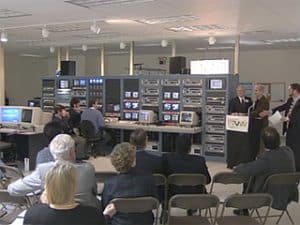
In what qualifies as a full circle memory, TVW’s current President Renee Radcliff Sinclair is also a former member of our House of Representatives (21st Legislative District) and she recalls that her first lobby visit after her election was from Lt. Governor Heck and Dale Vincent seeking her support for this proposed method of covering the Legislature.
2. What was TVW’s original name?
TVW was originally named “WASHPAN” for Washington Public Affairs Network (a take on CSPAN). Everyone quickly agreed that name was, well, awful, and it was changed to TVW.
3. When did TVW go on the air?
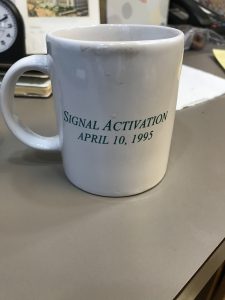
(Photo credit: Pat Dunn, longtime TVW supporter)
4. What was first broadcast?
The idea of covering legislative activity was not initially supported by a number of members of the Legislature. It took some time for them to see the upside. As a result, the first broadcast showcased oral arguments for a death penalty appeal in the Washington State Supreme Court. To this day, TVW continues to cover our State Supreme Court.
During a special legislative session in 1995, focused on state funding for what was then Safeco field, the House took a vote supporting turning on the cameras, so the first TVW coverage of the House centered on Floor debate for a baseball stadium. The Senate voted to turn on cameras for their events in 1996 and both chambers were regularly covered starting in 1997. At that time, they could only broadcast one event at a time, so TVW would tape other events and show later.
TVW’s motto is they provide “gavel to gavel coverage, anytime, anywhere, on any device.” It has taken time and investment to get there, but that motto is now a reality, particularly with their robust archives section on their website. (I didn’t know this, but you can also access programming on Roku and it’s even produced programs for Amazon Prime). There are now over 60 cameras on campus, filming as many as 15 events at once.
5. What is TVW’s budget and how much of that does the state cover?
TVW has an annual budget of $20 million and only $3 million of that is covered with state funding. TVW makes up the balance of its budget with sponsorships and individual gifts. Importantly, every cable company in our state carries TVW for free. TVW is not a state agency.
More from Renee
Renee also provided this great picture. It is of her in 1995 taking a committee vote on the funding strategy for the major league baseball stadium that eventually became Safeco Field and is now T-Mobile Park. This vote happened the same week that the House voted to turn on TVW’s cameras in hearing rooms and the House Floor.
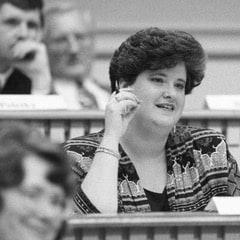
I asked Renee how they prepared for this year virtual year and she acknowledged they are operating with the good graces of human beings and technology, and both can fail. She said the legislative interim with the frequent press conferences by Governor Inslee allowed them to build the muscle and identify work arounds.
Additionally, TVW accessed CARES dollars which allowed them to increase their bandwidth (think servers and encoders) as well as to secure equipment to provide closed captioning. Finally, she said close coordination with legislative staff has also been key.
Renee highlighted that eyes on their product have skyrocketed with virtual session. They went from 10,000 regular viewers to one million viewers overnight and they have maintained those high numbers throughout session.
Two final points – Renee emphasized TVW’s original programming and encouraged people to check out shows like “Inside Olympia”. She’s right to be proud of that work. And she said the Floor sessions with part Zoom, part in-person are less chaotic than they thought they would be.
A huge thanks to Renee for not only being generous with her time and sharing these great stories and pictures, but to her and her entire team for their work to allow us all to safely stay engaged in the legislative process.
About the Author
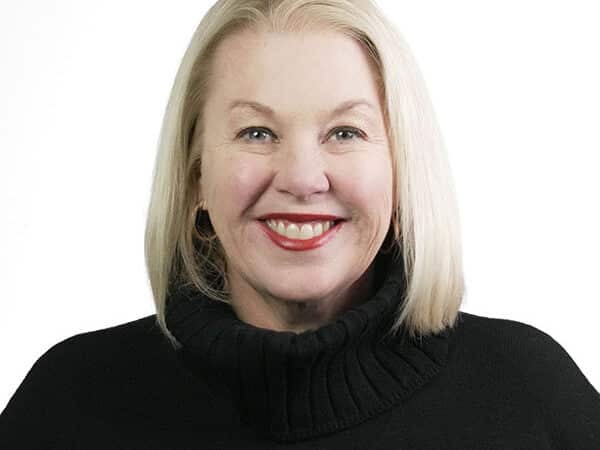
Erica Hallock
Director, Policy & Advocacy, Start Early Washington
Erica Hallock serves as the Director of Policy and Advocacy for Start Early Washington. She has worked in early childhood, health and human services policy in both California and Washington state.
More About Erica